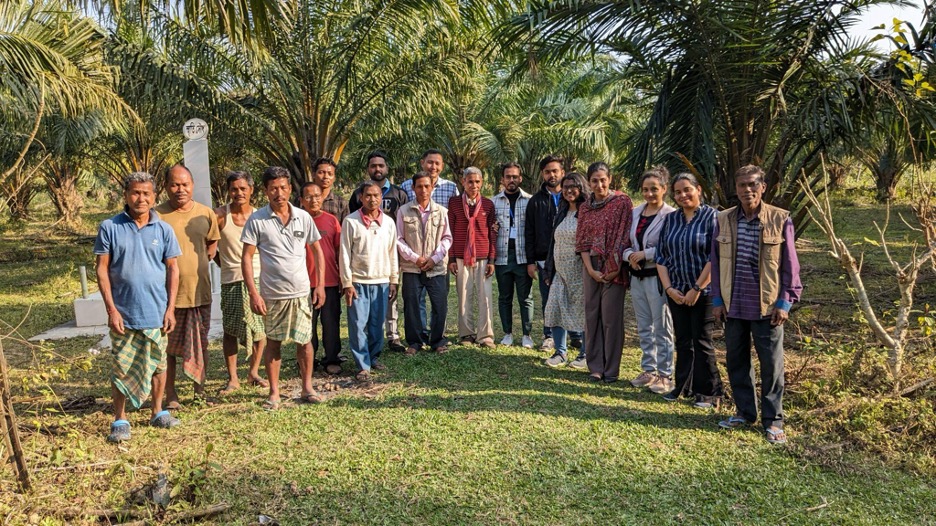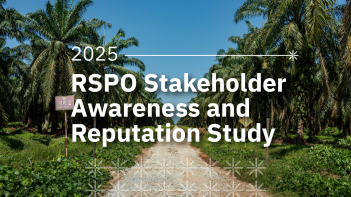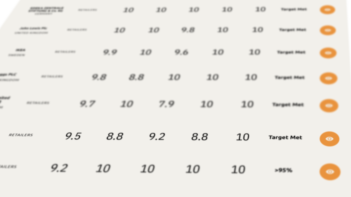
RSPO, along with Sattva Consulting, recently conducted and published a Smallholder Diagnostic Study of the Oil Palm Landscape in India, covering the states of Assam and Andhra Pradesh. The study provides a comprehensive baseline report on the profile and characteristics of oil palm smallholder farmers in these key regions, assessing their readiness to adopt sustainable practices, and thereafter proposes strategies and interventions to support their transition towards sustainability.
The published study focused on key areas including the two states’ yield and productivity, social and environmental impact and institutional environment. Notably, it shed light on the critical challenges faced by farmers in these regions, such as limited access to information and training on farm management and sustainability practices, revealing critical issues that affect farmers’ income, productivity, and overall farm sustainability.
“The findings of this significant study underscore the importance of access to information and training for farmers’ economic wellbeing in Assam and Andhra Pradesh,” says Ashwin Selvaraj, RSPO Deputy Director, Market Transformation (India and China). “It provides a critical snapshot of the main challenges smallholders face, and more importantly, provides concrete steps that can be taken to support their inclusion in the sustainable palm oil value chain, fostering a more resilient and productive agricultural sector in India.”
“India’s ambitious goal of self-reliance in the oil palm sector, championed by the National Mission for Edible Oils-Oil Palm (NMEO-OP), presents exciting opportunities for growth,” says Debaranjan Pujahari, Partner & Head of Agriculture Practice, Sattva Consulting. Our comprehensive study across Assam and Andhra Pradesh dives deep into the experiences of smallholder farmers and the industry landscape. By shedding light on farmer and industry dynamics, as well as socio-economic and environmental challenges, this research provides invaluable insights for all stakeholders. Industry players can leverage these findings to develop informed business plans that maximise opportunities while minimizing risks. Policymakers can use this data to design targeted programmes and policies that promote sustainable practices and equitable benefits for all stakeholders.”
Key Findings of Study
Below are some of the key findings and insights from the published study:
Limited Access to Information: A significant number of farmers struggle with inadequate access to essential information related to farm management. This lack of knowledge spans areas such as crop rotation, pest management, and soil health, all of which are vital for maintaining productive and sustainable farms.
Impact on Income and Yield: Farmers not equipped with sufficient training, modern farm management techniques and sustainability practices tend to experience lower yields and reduced income, making it difficult for them to invest in necessary resources or innovations that could improve their farm’s productivity.
Challenges in Adopting Sustainable Practices: Several barriers in the adoption of sustainable practices have been identified, including limited financial resources, lack of awareness, and inadequate support from local agricultural agencies.
Strategic Recommendations
To address the above identified challenges, the study recommends a multi-faceted approach, including:
Enhanced Training Programmes: Implementation of regular, accessible training sessions for farmers on sustainable farming techniques and modern farm management practices.
Improved Information Dissemination: Creation of platforms to facilitate information related to best farming practices, possibly through digital media or local agricultural extension services.
Supportive Policy Framework: Government and private sector collaboration to develop policies that provide financial and technical support to farmers in these regions.
Community Engagement: Involvement of local communities in sustainability initiatives to foster collective action and ensure that sustainable practices are embraced at the grassroots level.
The study projects substantial improvements in farm sustainability, income, and yield in the regions of Assam and Andhra Pradesh, should these recommendations be implemented effectively. Increased access to information and training will empower farmers to make informed decisions, adopt more sustainable practices, and ultimately, improve their livelihoods.
“Addressing these gaps identified in the RSPO-Sattva study requires collaborative efforts to implement targeted interventions, such as improving productivity, by providing tailored training programmes to account for the smallholders’ diverse socio-economic contexts,” added Ashwin. “On these multiple fronts, RSPO remains committed to supporting smallholders through strategic initiatives and partnerships with relevant stakeholders. As part of RSPO’s mission, we are focused on uplifting smallholders’ lives and livelihoods along their sustainability journey.”
Keep reading

Good News: RT2025 Early Bird Registration Extended!

Extension of RSPO Excellence Awards 2025 Submission Deadline!
Call for Expression of Interest: Ghana National Interpretation Task Force for 2024 RSPO Principles and Criteria (RSPO P&C)
Call for Expression of Interest: Côte D’Ivoire National Interpretation Task Force for 2024 RSPO Principles and Criteria (RSPO P&C) and Independent Smallholder (ISH) Standard

RSPO Gains Global Recognition in 2025 Stakeholder Study

Top 9 Retailers In Europe Committing To Sustainable Palm Oil

Register for RT2025 Early Bird Offer while it lasts!





